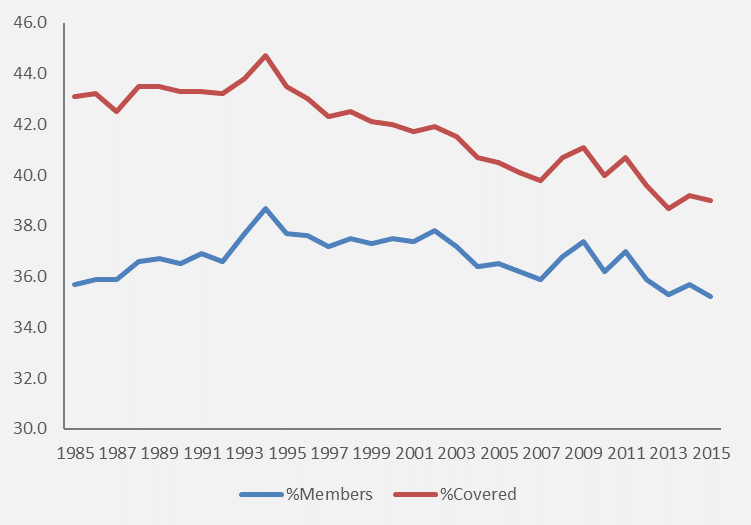Insight
March 31, 2016
Friedrichs v. California Teachers Association: “The judgment is affirmed by an equally divided Court.”
With one sentence the Supreme Court, shrunken by the passing of Justice Scalia, preserved the nation’s public service unions rights of charging non-union member’s fees that they feel violates their first amendment rights. Pundits have viewed the ruling as perhaps a stay of execution, arguing that the loss of fees would have financially devastated the unions. A closer look at union membership and coverage, as well as the number of states that already prohibited such agency fees, may however reveal a less concerning narrative.
This past January, the Court heard oral argument in Friedrichs v. California Teachers Association. The lawsuit, filed by the Center for Individual Rights on behalf of Rebecca Friedrichs and several other teachers in California public schools, challenged the California Teachers Association for charging an “agency” or “fair share” fee to pay for public sector collective bargaining, even though the teachers refused to join the union.
Background
Public employees cannot be forced to join unions and nonmembers are not required to pay fees that a union would use for political activity. However, a union may become the exclusive bargaining representative for public employees and may establish an arrangement, which requires even those nonmembers to pay union dues to cover the cost of collective bargaining – often referred to as fair-share fees.
The courts upheld this arrangement in the 1977 case, Abood v. Detroit Board of Education, which has allowed unions in 21 states to charge public employees they represent a fair share of the costs of collective bargaining. The general practice that then emerged is such that each year, unions must estimate the expenses related and unrelated to collective bargaining. Nonmembers are then notified of the expenses and must affirmatively opt out, otherwise the fee will be automatically deducted from their paychecks.
The Friedrichs v. California Teachers Association case presented two issues. First, whether public-sector “agency shop[i]” arrangements violate the First Amendment’s protections for freedom of speech and association. Here the petitioners asserted that compelled agency fees are a violation of the First Amendment because of the political nature of collective bargaining. In opposition, the union argued that eliminating agency fees would create a free riding problem. Second, whether it is a violation of the First Amendment to require that public employees affirmatively object to subsidizing public sector union political speech. Here the petitioners argued that the opt-out requirement takes advantage of nonmembers unaware of the affirmative objection requirement.
Were Unions Saved?
Had the decision eliminated the rights of unions to collect the fees many would have viewed it as a death blow for public service unions. The thought being that the unions rely on agency fees to cover basic administrative costs, and eliminating the fees would significantly weaken public sector unions. It’s worth noting, however, that 25 states as well as the federal government prohibit such fees and the unions continue to operate in those locations.
Source: EducationNext[ii]
Moreover, as Chart 1 (below) demonstrates, the gap between the percentage of public sector workers that pay union dues (which has remained relatively constant) and those workers that opt-out of paying dues while remaining covered by collective bargaining agreements has narrowed from 7 percent to 3.8 percent over the past 20 years. With this slight closing of the gap, it hardly seems plausible that the loss of this revenue would in fact be detrimental to the health of the sector.
Chart 1. Public Sector Workers Union Membership & Coverage[iii]
Source: Union Membership and Coverage Database, available at www.unionstats.com
*% Members = percent of employed workers who are union members.
*%Covered = percent of employed workers who are covered by a collective bargaining agreement.
Conclusion
With this ruling effectively upholding the 9th Circuit’s decision, we may never know if the loss of the fees posed a real threat to the union’s finances. Unfortunately, the question – are public servants around the nation required to financially assist a government union that they disagree with – also remains unanswered.
Lawyers involved with the case have said that a rehearing petition will be filed. Under the rules of the court, for there to be a rehearing of a case, five of the justices must vote in favor of reconsidering. Another option for challenging the agency fee question would be presenting a different case that works its way through lower courts and reaches the Justices after there is a full bench. Until then it seems we will have business as usual.
[i] An agency shop is a form of union security agreement where the employer may hire union or non-union workers, and employees need not join the union in order to remain employed. However, the non-union worker must pay a fee to cover collective bargaining costs.
[ii] Antonucci, Mike. “Teachers Unions At Risk Of Losing ˜Agency Fees”: Friedrichs V. California Teachers Association Could Fundamentally Alter The Education Labor Landscape”. Education Next. N.p., 2015. Web. 30 Mar. 2016.
[iii] Harry T. Hirsch and David A. Macpherson, “Union Membership and Coverage Database from the Current Population Survey: Note,” Industrial and Labor Relations Review. http://unionstats.gsu.edu/CPS%20Documentation.htm












